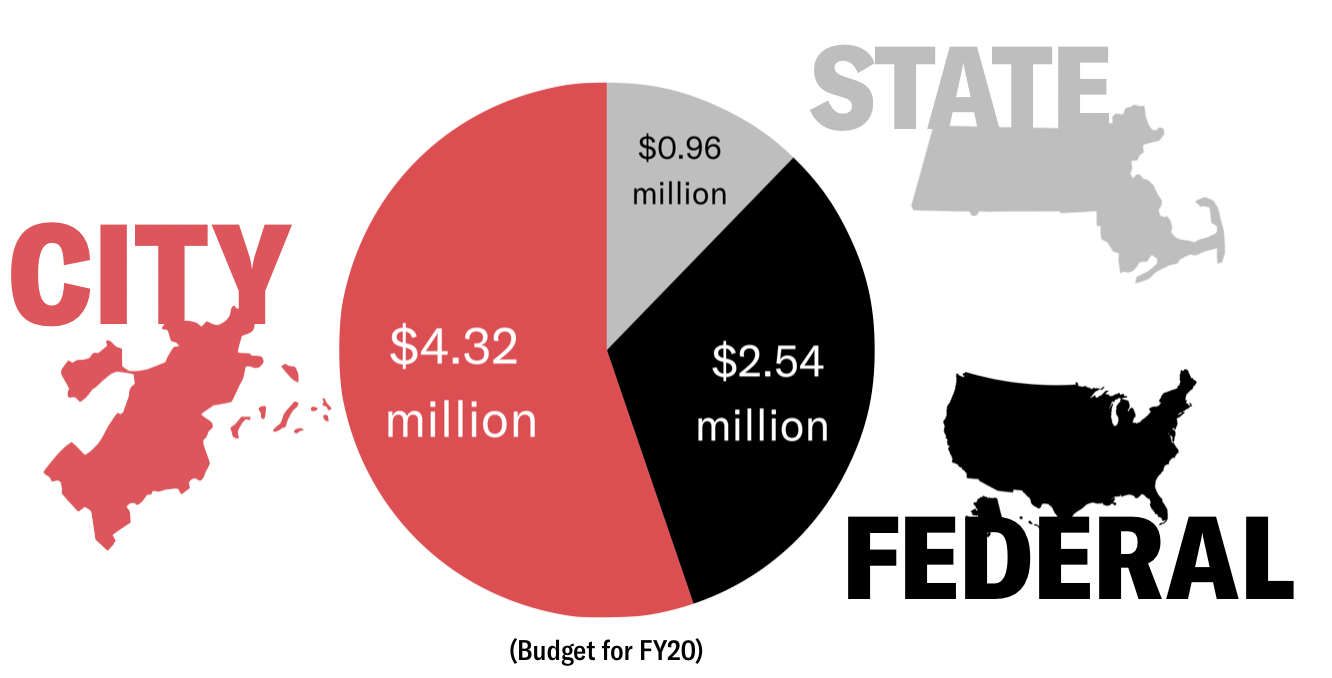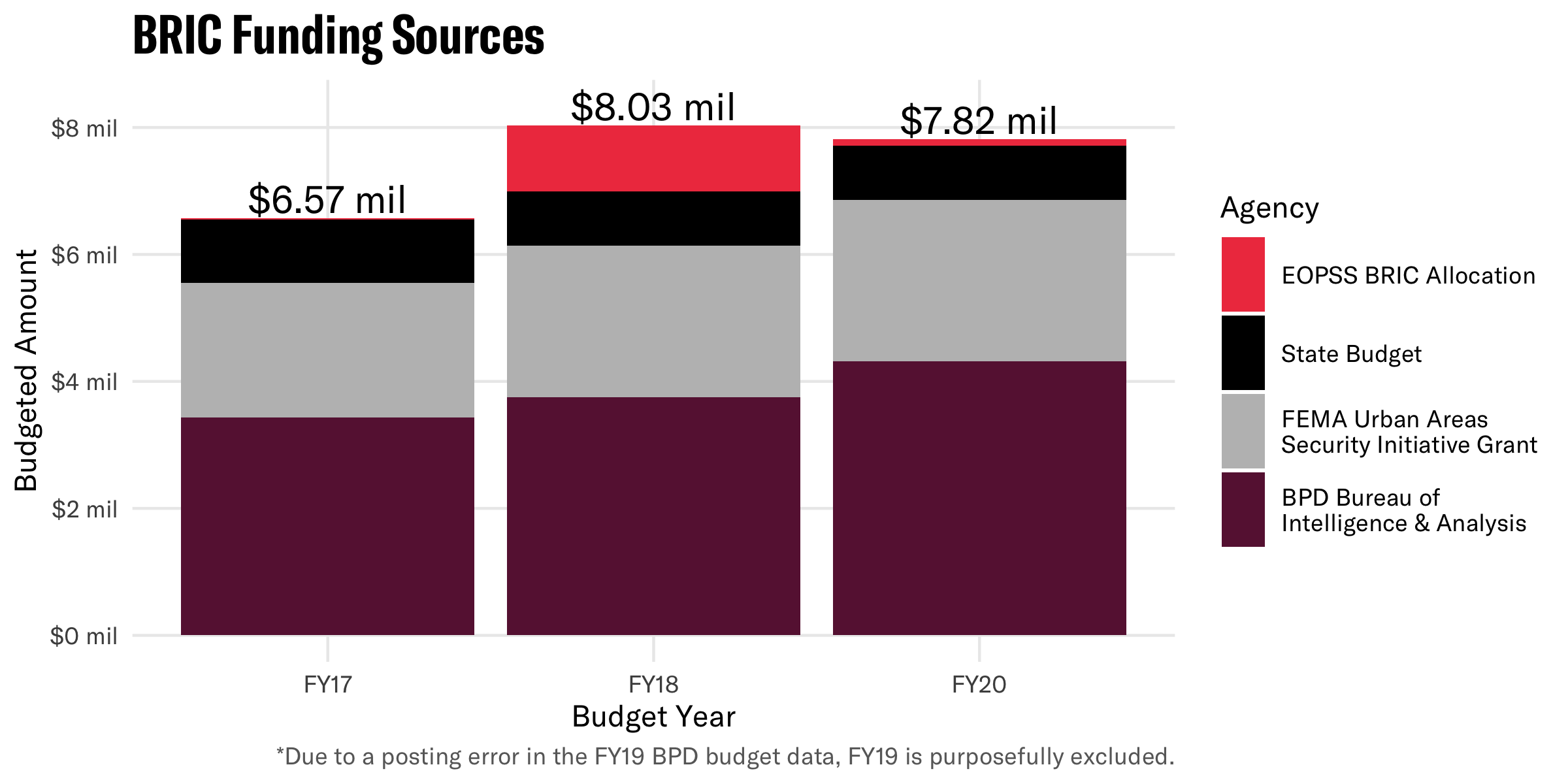Explore all of the ACLU of Massachusetts’ analysis on policing in the Commonwealth.
On Thursday, July 23, the Boston City Council is holding a hearing on three grants that would collectively approve over $1 million in additional funding to the Boston Police. These taxpayer dollars would go towards installing new surveillance cameras across Boston and funds for the Boston Regional Intelligence Center, or BRIC.
Thursday’s hearing is a re-run from a routine hearing which took place on June 4, in which the Boston City Council was slated to rubber-stamp these three grants – dockets #0408, #0710, and #0831. However, community advocate groups such as the Muslim Justice League rallied, urging the Councilors to be critical of – and ultimately reject – the BPD grants. Ironically, the BRIC representative failed to make an appearance at the hearing and the question of the grant approval was tabled for this future date.
Out-of-control funding of the Boston Police is nothing new – as discussed in an ACLU of Massachusetts analysis, in FY21 the initially proposed Boston Police budget was $414 million. Ultimately, the Boston City Council still approved $402 million for the BPD, despite thousands of constituents advocating for more substantial budget cuts.
However, specific scrutiny of the BRIC and its funding is long overdue. In recent years, city, state, and federal legislatures have authorized well over $7 million in funding for the BRIC each year. But due to BPD secrecy surrounding all things BRIC-related, it’s hard to paint a full picture of what the BRIC does with this funding. Indeed, the description of the program on the Boston Police Department website consists of a mere 122 words – so we are forced to consult alternate sources and public records requests to get any details.
A new analysis of public records by the ACLU of Massachusetts takes a closer look at where the BRIC’s money comes from — and what it’s used for.
What is the BRIC?
The Commonwealth of Massachusetts is home to two federal fusion centers: Department of Homeland Security-funded centers established after September 11th, which facilitate information sharing between local, federal, and state law enforcement. One such center, the Commonwealth Fusion Center, is operated by the Massachusetts State Police, while the second, the Boston Regional Intelligence Center, or BRIC, is operated by the Boston Police Department.
The BRIC operates across the entire Metro Boston Homeland Security Region (MBHSR), which includes Boston, Brookline, Cambridge, Chelsea, Everett, Quincy, Revere, Somerville, and Winthrop.
Ample and Diverse Funding
According to public records obtained and compiled by the ACLU of Massachusetts, the BRIC is funded by a combination of federal, state, and local budgets and grants.

Specifically, the BRIC receives funding from at least four distinct sources:
- Department of Homeland Security (DHS) Federal Emergency Management Agency (FEMA) Urban Areas Security Initiative (UASI) grants
- Massachusetts Executive Office of Public Safety and Security (EOPSS) yearly allocations, most likely from the DHS FEMA State Homeland Security Grant program
- Massachusetts state budgets (passed through the Executive Office of Public Safety and Security (EOPSS); line item 8000-1001)
- City of Boston operating budgets (via the Boston Police Department’s Bureau of Intelligence & Analysis)

These four funding streams combined lead to the BRIC receiving approximately $7-8 million each year in public funds.
Note that correspondence with the City of Boston revealed that publicly available data for the FY19 BPD Bureau of Intelligence & Analysis budget is incorrect due to a “posting error”, and so FY19 is excluded from all figures.
Additionally, it’s important to note that due to the lack of transparency, these four sources might not encompass all of the funding coming into the BRIC. For instance, a FY21 report of BPD contracts shows $4 million in payments for “intelligence analysts” to Centra Technologies between 2018 and 2021, likely working at the BRIC. If so, the BRIC budget may indeed be millions of dollars greater than what we are able to report today.
Who’s on the payroll?
How many people do work for the BRIC – and get their salaries from its budgeted funds? Ten? Sixty? It’s difficult to know.
Expense reports reveal at least 41 employees received training from the BRIC between 2017 and 2019 – but 10 of these names do not appear on the City of Boston payroll for those years.
Records show that the BRIC has some dedicated employees: in FY20, the personnel budget for the BPD’s Bureau of Intelligence and Analysis – whose sole charge seems to be the management of the BRIC – was $4.3 million. And in 2019, BRIC expense reports show $1.8 million in payments towards contracted “Intelligence Analysts” through companies such as Centra Technology, The Computer Merchant, and Computer and Engineering Services, Inc. (now Trillium Technical). But would this $1.8 million support 7 analysts making $250k per year? 30 analysts at $60k? The records do not provide clarity on this point.
Finally, confusion around one of the grants being discussed at Thursday’s hearing, proposed in docket #0408, further epitomizes the BRIC’s financial obfuscation around its payroll. The docket formally proposes $850,000 in grant funding to go towards “technology and protocols.” However in discussion at the June 4 hearing it was revealed that, in actuality, part of the grant would go toward hiring 6 new analysts.
By keeping under wraps the roles and job titles of BRIC employees, and even simply the size of the Center, BRIC obstructs transparency, public accountability, and city council oversight.
Hardware and Software Galore
Between 2017 and 2020, BRIC expense reports show the Center spent almost $1.3 million on hardware and software. Thorough review of these reports reveals exorbitant spending: on software of all flavors, scary surveillance technologies, frivolous tech gadgets, and some obscure mysteries.
A number of the expenses are clearly for surveillance cameras and devices, including $106,700 in orders for “single pole concealment cameras”. These pole cameras were bought from Kel-Tech Tactical Concealments, LLC, a company which also supplied the BRIC with some truly dystopian concealment devices such as a “Cable splice boot concealment” ($10,900), a “ShopVac camera system” ($5,250), and a “Tissue box concealment” ($4,900). These purchases imply the BRIC is hiding cameras in tissue boxes, vacuum cleaners, and even electrical cables.
Some of the charges on the report are just too vague to interpret. This includes the largest hardware/software charge in the entire report: $164,199 paid to Carousel Industries for “BRIV A/V Upgrade per Bid Event”. There’s $36,997 in “Engineering Support”, paid to PJ Systems Inc. and $15,606 in a “C45529 CI Technologies Contrac[t]”, paid to CI Technologies. And concerningly, there is a cumulative $16,200 in charges described simply as “(1 Year) of Unlimited” paid to CovertTrack Group Inc. – a company which also supplied the BRIC with a “Stealth 4 Basic Tracking Devic[e]” to the tune of $7,054.
When it comes to computing hardware, there’s no skimping either. Reports show over $200,000 in expenses for servers, and over $67,000 for various laptops. And apparently the BRIC prefers Apple products – judging by the $10,000 they spent on iPad pros, almost $1,000 on Apple Pencils, and $367 on Apple TVs.
Yet the most indulgent spending is on software. Between 2017 and 2020, the BRIC purchased at least 13 specialized software products for intelligence analysis, crime tracking, public records access, device extraction, and more.
| Software | Use | BRIC Expenses 2017-2020 |
| IBM i2 | “Insight analysis” | $124,852 |
| CrimeView Dashboard | Crime analysis, mapping and reporting | $58,009 |
| Accurint | Public records searches | $32,803 |
| Esri Enterprise | Geospatial analysis | $27,000 |
| Thomson Reuters’ CLEAR | Public records searches | $25,322 |
| CrimNtel GIS | Crime analysis, mapping and reporting | $21,016 |
| Computer-Aided Dispatch (CAD) Interface | Emergency response | $16,387 |
| Cellebrite Universal Forensic Extraction Device (UFED) Ultimate 4PC | Device data extraction | $12,878 |
| CaseInfo | Case management | $10,508 |
| NearMap | Geospatial analysis | $9,995 |
| ViewCommander-NVR | Surveillance camera recording | $3,778 |
| eSpatial | Geospatial analysis | $3,650 |
| XRY Logical & Physical | Device data extraction | $2,981 |
And worse, there is redundancy between the products – the BRIC purchased three different geospatial analysis products, two public records search products, and two device data extraction products.
This smorgasbord of tools begs the question: What, if any, supervisory procedures exist within the BRIC to prevent irresponsible spending of taxpayer dollars on expensive, duplicative software?
And furthermore, some of these public records databases give users immense power to access residential, financial, communication, and familial data about almost any person in the country. So who, if anyone, oversees the use of powerful surveillance databases like Accurint and CLEAR, to ensure they aren’t being used to violate basic rights and spy on ex-girlfriends?
From a history of First Amendment violations in Boston, to their role in threatening local immigrant students with deportation, to a 2012 bipartisan Congressional report concluding fusion centers such as the BRIC have been unilaterally ineffective at preventing terrorism, there is much evidence in support of the BRIC being wholly defunded. But at the very least, the Boston City Council must end the practice of writing blank checks for the Boston Police to continue excessive and unscrutinized spending of taxpayer dollars.
The Boston City Council must reject the additional $1 million in funding to the Boston Police being proposed in these three grants. To learn more about the BRIC, the proposed grants, and to urge the City Council to reject them, we encourage you to:
- Consult the Muslim Justice League Toolkit to Get the BRIC Out of Boston
- Sign a petition telling Boston City Councilors to reject BRIC-related grants before Tuesday, July 28
- Submit written testimony for the BRIC budget hearing before 9:30 AM on Saturday, July 25, telling Boston City Councilors to reject BRIC-related grants
